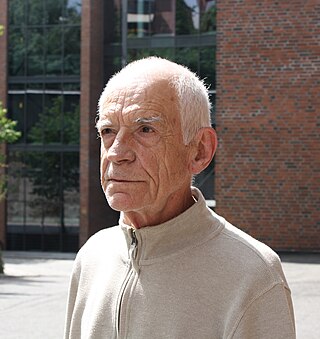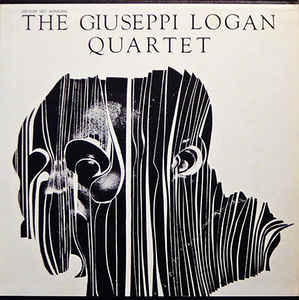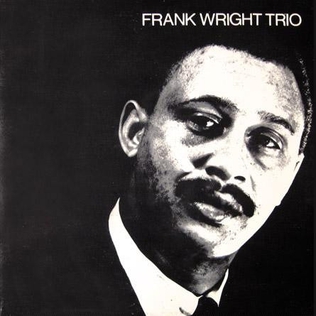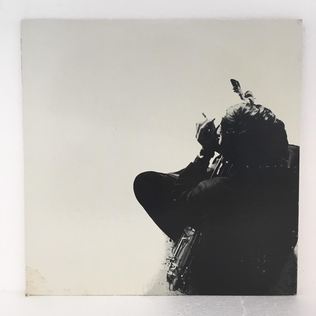
Gary George Peacock was an American jazz double bassist. He recorded a dozen albums under his own name, and also performed and recorded with major jazz figures such as avant garde saxophonist Albert Ayler, pianists Bill Evans, Paul Bley and Marilyn Crispell, and as a part of Keith Jarrett’s “Standards Trio” with drummer Jack DeJohnette. The trio existed for over thirty years, and recorded over twenty albums together. DeJohnette once stated that he admired Peacock's "sound, choice of notes, and, above all, the buoyancy of his playing." Marilyn Crispell called Peacock a "sensitive musician with a great harmonic sense."

Town Hall, 1962 is an album by Ornette Coleman, recorded on December 21, 1962 at New York City's Town Hall and released in 1965 by the ESP-Disk label. It was the first recording to feature Coleman's new trio, which included bassist David Izenzon and drummer Charles Moffett.
Lowell Davidson was a jazz pianist and biochemist from Boston, Massachusetts. He was known for his "sensible and free flowing approach to unconventional linear improvisation", but appeared on only a handful of commercially-available recordings. Davidson also played bass, percussion, organ, electronic keyboards, and reed instruments.

Spiritual Unity is a studio album by American free jazz saxophonist Albert Ayler. It was recorded on July 10, 1964 in New York City, and features bassist Gary Peacock and drummer Sunny Murray. It was the first album recorded for Bernard Stollman's ESP-Disk label, and it brought Ayler to international attention as it was so "shockingly different". At the same time, it transformed ESP-DISK into "a major source for avant-garde jazz". A 5-star review in AllMusic called it a "landmark recording that's essential to any basic understanding of free jazz", "the album that pushed Albert Ayler to the forefront of jazz's avant-garde... really the first available document of Ayler's music that matched him with a group of truly sympathetic musicians", and stated that "the results are a magnificently pure distillation of his aesthetic."

Featuring Pharoah Sanders and Black Harold is a jazz album by Sun Ra, recorded live on December 31, 1964, but not released until 1976, on Ra and Alton Abraham's El Saturn label. An expanded version of the album was reissued in 2009 by ESP-Disk, and again in 2017 by Superior Viaduct. A complete version of Sun Ra's performances on December 30 and 31, 1964 were released in 2012 on the Pharoah Sanders album In The Beginning 1963-1964.

Staying on the Watch is the debut album by jazz musician Sonny Simmons. It was released as ESP-1030 on the ESP-Disk label in 1966. The cover photograph is a mirror image displaying Simmons playing left handed against the NYC skyline.

Charles Tyler Ensemble is the debut album by American jazz saxophonist Charles Tyler, which was recorded in 1966 in New York City and released on ESP-Disk.

Barrage is the fifth album led by jazz pianist Paul Bley. The album was recorded by Bley's quintet in 1964, released by ESP-Disk, and features saxophonist Marshall Allen in a rare appearance outside the band of Sun Ra.

Closer is the seventh album led by jazz pianist Paul Bley, featuring seven compositions by Carla Bley, recorded in 1965 and released on the ESP-Disk label.

Prophecy is a live album by American free jazz saxophonist Albert Ayler recorded in New York City on June 14, 1964 and first released in 1975 on the ESP-Disk label.

Colorfield is an album by American jazz guitarist Joe Morris, which was recorded in 2009 and released on the ESP-Disk label. He leads a trio with pianist Steve Lantner, in his first recording with Morris as leader, and long-time collaborator drummer Luther Gray. The music is inspired, in part, by the Color Field school of painting, in which large patches of color, occasionally just one color, make up the composition. Another inspiration for the music is the early Cecil Taylor Unit recordings with Jimmy Lyons on alto saxophone and either Sunny Murray or Andrew Cyrille on drums.

Vietnam, also referred to as Vietnam 1 & 2 is a live album by the Revolutionary Ensemble, violinist Leroy Jenkins, bassist Sirone and drummer Jerome Cooper, which was recorded in 1972 and released on the ESP-Disk label.

The Giuseppi Logan Quartet is an album by American jazz saxophonist Giuseppi Logan, recorded at Bell Sound Studios in 1964 and released in 1965 on the ESP-Disk label. His first recording as leader, it features Logan on alto saxophone, tenor saxophone, Pakistani oboe, bass clarinet, and flute along with pianist Don Pullen, bassist Eddie Gómez, and drummer Milford Graves. Logan had moved to New York City in September 1964, and the recording took place shortly after the October Revolution in Jazz, at which Logan performed, and during which he met ESP-Disk founder Bernard Stollman. According to Logan, the musicians had not played together prior to the recording session.

More is the second album by American jazz saxophonist Giuseppi Logan, recorded in May 1965 and released in 1966 by the ESP-Disk label. The album features Logan on alto saxophone, bass clarinet, flute, and piano along with pianist Don Pullen, bassists Eddie Gómez and Reggie Johnson, and drummer Milford Graves.

Percussion Ensemble is an album by American percussionist Milford Graves, recorded in July 1965 and released in 1966 by the ESP-Disk label. On the album, Graves is joined by fellow percussionist Sonny Morgan. The two had previously recorded together on the Montego Joe albums Arriba! and Wild & Warm. Morgan would go on to play and record regularly with Leon Thomas and others, but died in 1976.

Frank Wright Trio is the debut album by saxophonist Frank Wright. It was recorded in November 1965 in New York City, released by ESP-Disk in 1966, and reissued on CD in 1992. On the album, Wright is joined by bassist Henry Grimes and drummer Tom Price. The tracks were also reissued in 2005 on the Frank Wright compilation The Complete ESP-Disk Recordings.

In Search of the Mystery is the debut album by saxophonist Gato Barbieri. It was recorded in New York City on March 15, 1967, and was released later that year by ESP-Disk. On the album, Barbieri is joined by cellist Calo Scott, bassist Norris Jones, and drummer Bobby Kapp.

The Complete ESP-Disk Recordings is a two-CD compilation album by saxophonist Frank Wright. Issued by ESP-Disk in 2005, it contains two studio albums released by the label during the 1960s: Frank Wright Trio, recorded in 1965 and issued in 1966, featuring bassist Henry Grimes and drummer Tom Price, and Your Prayer, recorded and released in 1967, featuring saxophone Arthur Jones, trumpeter Jacques Coursil, bassist Steve Tintweiss, and drummer Muhammad Ali. The compilation also features a twelve-part interview with Wright, conducted by ESP-Disk founder Bernard Stollman.

The Will Come, Is Now is an album by bassist Ronnie Boykins, his sole release as a leader. It was recorded during February 1974, and was released on LP in 1975 by ESP-Disk. On the album, Boykins is joined by multi-instrumentalists Joe Ferguson and Jimmy Vass, saxophonist Monty Waters, trombonist Daoud Haroom, and percussionists Art Lewis and George Avaloz. Saxophonist Marzette Watts was the recording engineer.

Noah Howard Quartet is the debut album by alto saxophonist Noah Howard. It was recorded in New York City during January 1966, and was released later that year by ESP-Disk. On the album, Howard is joined by trumpeter Ric Colbeck, bassist Scotty Holt, and percussionist Dave Grant.



















